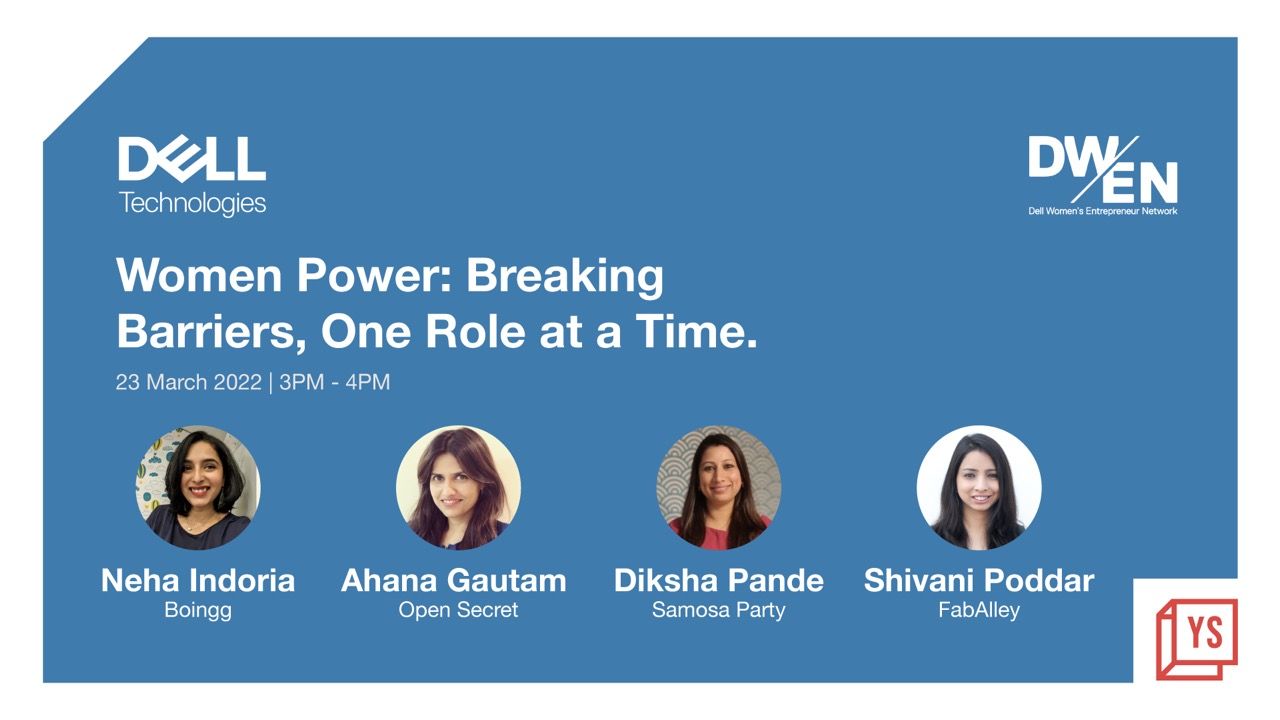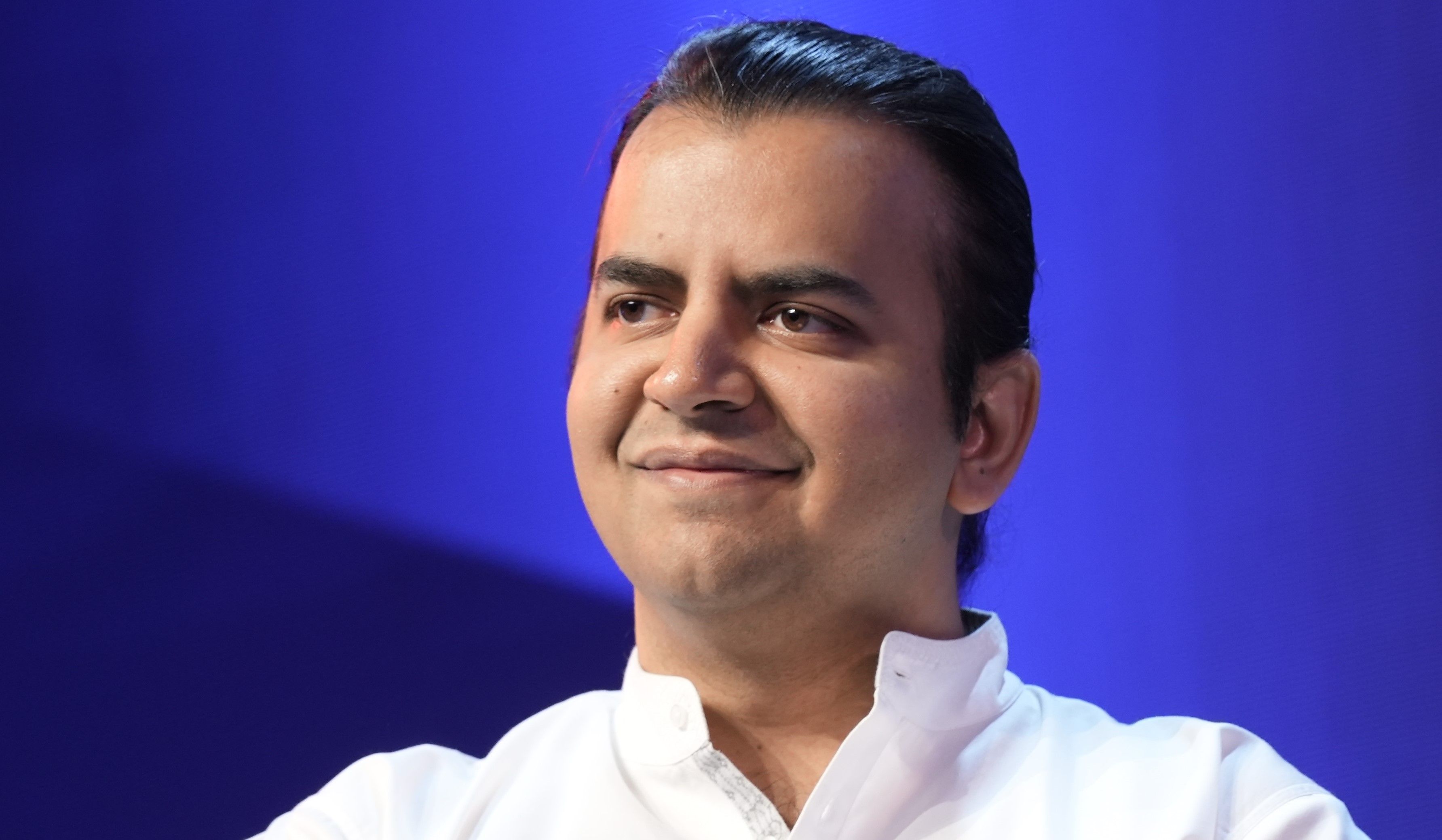
Dell Technologies
View Brand PublisherFour successful women entrepreneurs share their journeys and insights to inspire aspiring women entrepreneurs
At a webinar curated by Dell Women’s Entrepreneur Network (DWEN), four successful women entrepreneurs got together to share their entrepreneurship journeys, challenges, and growth insights to inspire other women looking to pursue entrepreneurship.
In India, women founded and co-founded startups account for only around 6 percent of total investments infused into the Indian startup ecosystem, according to YourStory data. Of the $66.76 billion raised between 2018 and 2021, startups with women as co-founders accounted for just around 6 percent, while solo women founders accounted for a measly 0.78 percent of that pie.
Do women want to become entrepreneurs? Absolutely!
A recent Facebook study revealed that four out of five women in India want to start their own businesses. Unfortunately as evidenced, the conversion rate is not high. Rampant gender bias, lack of investor confidence, and a lack of role models are often cited as the main obstacles to women becoming and growing as entrepreneurs.
So, how can we make it easier for women to start and scale businesses? How can we close the gender gap in entrepreneurship? How can women leverage technology to build businesses thrive? To decode the challenges, opportunities, and the way forward for women entrepreneurship in India, the Dell Women’s Entrepreneur Network (DWEN) brought together four successful women founders from the startup ecosystem to share their journeys, challenges, and insights to inspire aspiring women entrepreneurs.
Neha Indoria of Boingg! on the nuts and bolts of a successful kid’s furniture brand
When Neha was creating a room for her daughter, the lack of options led her to learn more about the children’s furniture segment. In the highly unorganised market, options available were either cheap products made out of plastic or low quality raw materials, or were imported and not affordable for the Indian middle class.
Taking things into one’s own hands, in terms of finding the right designs online and getting a local carpenter to replicate them, can be frustrating and time consuming. This is what led her to create Boingg!, an exclusively crafted furniture range for kids.
When Boingg! started out in 2019, Neha faced practical challenges in terms of designing the products and investing in R&D to ensure the strength and safety of its products. At that time, Boingg! was highly labour intensive and until the quality and materials were proven, the startup had to hold back in terms of investing more in its operations and communications. A few years down the line, the biggest challenge for Boingg! is keeping up with demand.
“We approached the manufacturing process by asking ourselves how we could use technology and machinery to make processes as uniform as possible across the board so that quality issues can be kept to a minimum,” says Neha, who now hopes to reach automation levels of around 80 percent over the next few months.
Ahana Gautam of Open Secret shares her recipe for success
Growing up in Bharatpur – a small town in Rajasthan – and raised by a single working mother, Ahana’s struggle stemmed from her own childhood. Ahana, who went on to study abroad, realised that unlike foreign supermarkets that had aisles full of healthy snacking options, Indian counterparts lacked the same. This led Ahana and co-founder Udit Kejriwal to launch the healthy snack brand Open Secret in 2019, a foodtech startup that sells healthy cookies and “better-for-you” snacks for children.
“As I started learning more about this space, I realised that India was one of the most unhealthy packaged food countries in the world. I wanted to change that and came back to India with a mission to provide access to better snacking for every Indian family,” she says.
Another reason that led Ahana to start up was to prove to girls in her hometown that anything is possible. Interestingly, a majority of Open Secret’s leadership team consists of women. Ahana also wants to bring back mothers to work and believes in the need to empower women for India to become a $5 trillion economy.
Ahana is a firm believer in tech, and the role it can play in empowering women entrepreneurs to succeed. “Because of tech, you can completely reimagine the entire value chain of FMCG, and that is something which we are trying to do at Open Secret,” she says.
“A decade ago, you could not imagine becoming a challenger brand competing with the big incumbent brands in categories like cookies and chips. We grew 10x In the last 12 months, and today, more than 53 percent of our sales come from outside top tier cities, something that would have never been possible without the innovations in the space,” she adds.
Diksha Pande of Samosa Party on why ‘Samosa’ is king
Bengaluru-based Samosa Party, co-founded by Diksha Pande, is a D2C startup using one of India's most humble snacks. Selling over 50 lakh samosas a year, the foodtech startup is dressing up the humble snack with a dash of tech. She noticed there weren’t any large-scale brands of local snacks, with people relying on their neighbourhood halwais and shops.
Having spent most of her career in the F&B ecosystem – from the Oberoi Group to Pizza Hut to Chai Point – Diksha leveraged her deep understanding of the space to create a business model that worked well at scale.
“With Samosa Party, we are actually building India's first quick service restaurant (QSR),” she says, talking about the role of tech in their success.
Understanding that the only way to solve their supply problem at scale was through automation and technology, she built a lot of automation internally. “Everything that we do is in a way handcrafted, but with a lot of technology that enables it,” she shares.
“Since we have 14 varieties of fillings, we would receive a lot of feedback from our online customers on the difficulty in identifying the different fillings. To solve this customer problem, we imprint the name of the filling on the samosa. We also put numbers that are codified with respect to which batch they have come out from,” Diksha adds.
FabAlley’s Shivani Poddar on runway to success
Since its inception in 2012, apparel brand FabAlley has been offering customers affordable and chic clothing options. An online-first fashion store that has a unique collection of women’s clothing, The brand has witnessed huge growth with e-commerce leading the charge. This is largely due to the shift from offline to online amid COVID-19, with the ecommerce front expected to see 100-120 percent year-on-year growth.
“D2C is a fairly large channel for us with our website and apps. It helps us serve the customer directly, both in India and outside the country,” she says.
Building a world-class website and a tech stack that gives customers a great experience is key. “We have to compete with the likes of Amazon, so creating an omnichannel experience that compliments the offline and the online is key,” she adds.
If you’d like to be a part of DWEN, the platform that connects women entrepreneurs around the globe with resources and community, you may visit dwen.com .
DWEN: the network that helps you advance your business
For more than a decade, DWEN has brought women entrepreneurs together from around the world to help them connect with each other, scale their businesses, and ultimately succeed.
The DWEN community welcomes all levels of entrepreneurs, from startups to scale-ups. Joining DWEN gives members access to women entrepreneurs from around the world and valuable resources to grow their businesses – including the latest technology, access to funding resources, and best practices from a global network of members.
DWEN invites members from the entrepreneurship ecosystem from any of the following women founders, business owners, and aspiring entrepreneurs.











![[Funding alert] Fintech startup Mera Cashier raíses $150K from Bollywood singer Sukhbir Singh, others](https://images.yourstory.com/cs/2/b87effd06a6611e9ad333f8a4777438f/8-08-1585809790168.png)